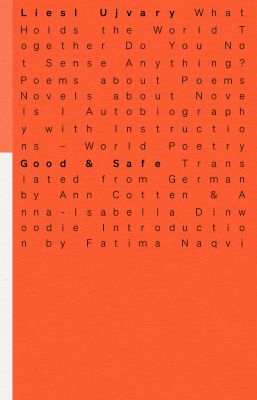
Good & Safe
ISBN-13: 9781954218376
Author(s): Liesl Ujvary
Subjects: Poetry - Individual Poets
Publisher: World Poetry Books
Publisher Imprint: World Poetry Books
Publication Date: 16-10-2025
Format: Paperback / softback
Availability: In stock

ISBN-13: 9781954218376
Author(s): Liesl Ujvary
Subjects: Poetry - Individual Poets
Publisher: World Poetry Books
Publisher Imprint: World Poetry Books
Publication Date: 16-10-2025
Format: Paperback / softback
Availability: In stock
About the book